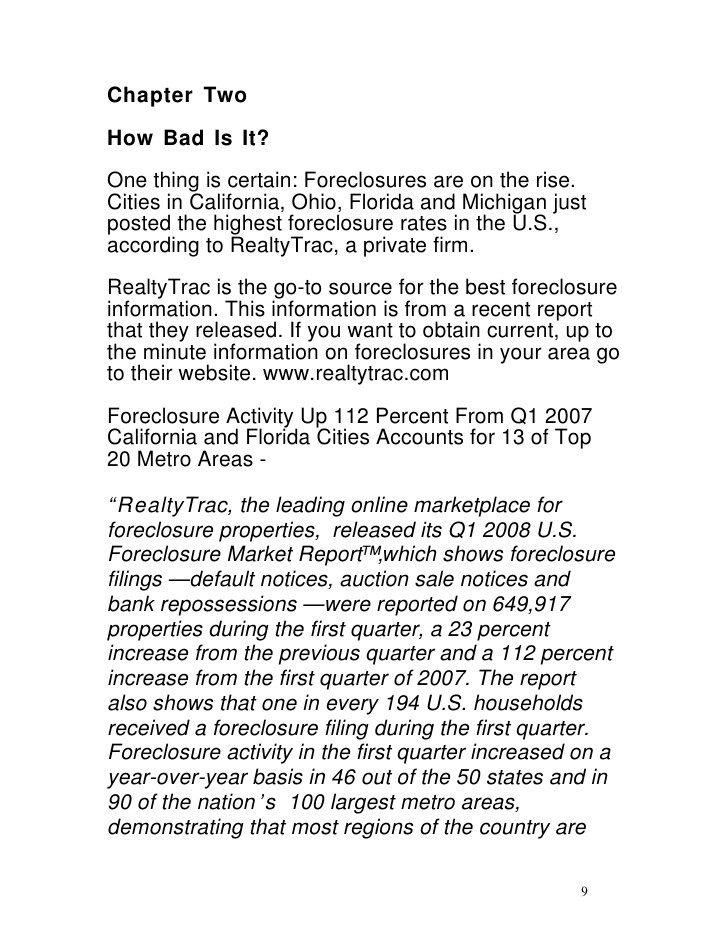Short Sales Chapter 9
Post on: 11 Июль, 2015 No Comment

Securing a Short Sale Package
What is a Short Sale?
A short sale refers to a transaction when a buyer can purchase a home for less than the remaining loan amount. The advantage is the short sale buyer can save a significant amount on the purchase price, as long as the buyer is willing to take part in a more complicated transaction. The transaction is more complicated because it requires both the lender and the home owner to agree to the purchase price, as opposed to a normal sale when the homeowner can make that decision on their own. This is because the lender will receive less money from a short sale than they would have received if the homeowner paid the full amount of the loan.
Who benefits from Short Sales?
All parties involved in the transaction benefit. The lender benefits by avoiding the costs of foreclosing on the property, which are often higher than taking the loss on the loan. The homeowner benefits by avoiding a foreclosure, which can damage their credit history and raise the costs of borrowing money in the future. The buyer benefits by purchasing the distressed real estate at a discounted price, since the homeowner and lender are both highly motivated sellers.
Where does a Short Sale Buyer begin?
There are two things to keep in mind when thinking about doing a short sale. As the buyer, you need to approach the homeowner to start the short sale process. This is because the majority of banks will agree to a short sale only after the homeowner has received a formal offer. Also, make sure that there is a pre-workout agreement, or short sale package, between the lender and the homeowner. This agreement helps make sure the short sale negotiations will go smoothly.
Creating a Short Sale House
First, locate a property where the debt of the homeowner is more than the amount the property can be sold for. Approach the homeowner and make a formal offer on the property. Keep in mind a short sale can take anywhere between 1-6 months to complete. You’ll need to line a set of documentation to submit before a short sale can be approved. These documents generally include: a short sale application, tax returns, pay stubs, a hardship letter, a purchase agreement from the buyer, financial statements, and payoff letters from all lenders involved. After submitting the documentation, it generally takes 2-6 weeks to receive lender feedback on the application. Don’t be discouraged by the wait. Remember, the goal of the short sale buyer is to obtain property at an amazingly low price. It’s worth the wait.

Pre-Workout Agreements
Most lenders require a pre-workout agreement prior to starting workout negotiations. Pre-workout agreements can take a variety of forms that range from a brief letter to a detailed contract that lays the foundation for future negotiations between the defaulting borrower and the lender. A well-written agreement establishes the history of the loan and the procedure for negotiating the short sale. It protects the borrower by preventing the lender from pursuing foreclosure on the property during the workout and allows the lender to avoid potential lender liability claims and defenses against their right to foreclose.
Tips for the Short Sale Buyer
- Do your homework before making an offer. Check public records. Find out who is on the title, how much is owed to the lender (to figure out how much to offer for the property) and if a foreclosure notice has already been filed (a short sale can only happen at the pre-foreclosure stage).
- Make sure you know how many loans are on the property. Avoid properties with more than one loan.
- Search for properties where the price is too low for the neighborhood, the property may already be in the short sale process.
- Make sure both the lender and the seller agree to your purchase offer. Both parties must agree in order for the short sale to go through. Have your agent submit the required documentation for approval.
- Get the appropriate contact for the lender and give them a deadline to respond to make sure your paperwork is processed in a timely manner.
- Once you find the home you desire, partner with an agent with short sale expertise.
- Ask your agent to waive the difference in commission between the buyer’s broker agreement and the lender negotiated commission.
- Make sure the lender allows you to conduct the necessary home inspections before you purchase the property.
Today’s mortgage crisis is leading to an increase in the number of short sales and presenting wonderful buying opportunities for the willing buyer. Declining home values are causing a huge drop off in home equity (the property’s market value minus the loan amount) and homeowners are struggling to meet their monthly payments due to mortgage interest rate hikes. Distressed homeowners are no longer able to refinance their way out of unmanageable loans. We are seeing historically high foreclosure rates across the country due to eroding home values and problems in the credit markets.
The Mortgage Forgiveness Debt Relief Act was recently passed by the federal government to help address this growing problem. Prior to its passage, the amount forgiven in a short sale was reported as taxable income. Now, distressed homeowners don’t need to worry about income tax liabilities when considering short sales. This legislation is leading more people to take the short sale route and as a result, providing the buyer with a larger pool of discounted properties to choose from.














